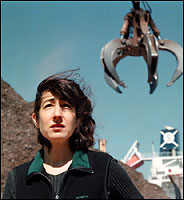Nothing lasts forever, but garbage comes pretty close. After being whisked away by the sanitation department, it may change location, or, after recycling, morph into unrecognizable forms. But it never really goes away. Even when dead and buried, it can come back to life decades later. In Ireland, to cite a recent instance, erosion has exposed tons of dumped garbage, which is now tumbling into the sea.
On the Secret Trail of Trash
By Elizabeth Royte
311 pages. Little, Brown and Company. $24.95.
In "Garbage Land: On the Secret Trail of Trash," Elizabeth Royte shines a light on everyone's dirty secret. Like a garbage detective, she follows the used plastic bags, drink containers, old newspapers and, yes, bodily excretions that disappear into the trash can or down the toilet, only to reappear somewhere else, out of sight and out of mind. She starts at home, in her Brooklyn apartment, and then heads out on an odiferous odyssey that takes her from landfill to recycling center to sludge depot, following her own small contribution to the nation's municipal waste stream, which reached a staggering 369 million tons in 2002.
It's a fascinating, sometimes tiring, often depressing tour. Ms. Royte, the author of "The Tapir's Morning Bath: Solving the Mysteries of the Tropical Rain Forest," is a dogged reporter and a vivid writer, which means that her catalog of crimes against nature hits the senses hard. She has a keen eye and a sensitive nose. At the New York Organic Fertilizer Company in Hunts Point, in the South Bronx, where human waste emerges as fertilizer pellets bound for Florida citrus groves and Ohio soybean fields, she inhales tentatively, trying to pinpoint the fragrance that the plant's manager describes, hopefully, as "a musty, cheesy odor." Ms. Royte has her doubts. "This wasn't the aroma of any cheese I'd ever sniffed," she writes. "Nor was it the ammoniac smell of a Port-O-San or the earthier tones of the outhouse. It wasn't the chicken or cow manure of my childhood garden. Elusive and remote, the name of the scent lingered just out of my reach (unlike the odor itself, which would stay with me for several hours to come)." Even after a shower, she sends fellow subway passengers fleeing on her way home from the plant.
Unpleasant odors are the least of it. As she makes her rounds, Ms. Royte cites a blizzard of studies, statistics and experts to prove that the garbage problem threatens to bury us all. The numbers, flying from every direction, are alarming, and they are meant to be. Americans now throw out 4.3 pounds of garbage each day, 1.6 pounds more than they threw away 30 years ago. Now that the Fresh Kills landfill is closed, it takes 450 tractor trailers, traveling 135,000 miles in combined round trips and burning 33,700 gallons of diesel fuel to transport a day's worth of New York City's garbage to out-of-state landfills and incinerators. And this is just municipal waste, which accounts for a mere 2 percent of the national total, making Ms. Royte's feverish efforts to re-use, recycle and compost seem close to futile.
She recognizes this. A running theme in "Garbage Land" is her own battle to reduce her household garbage to an absolute minimum. She sifts through her garbage ever more finely, weighing and separating according to ever more arcane formulas - "I began to slice my banana peels into squares the size of Wheat Thins and whittle my celery stalks into matchsticks" - knowing full well that her efforts make little or no difference.
In the end, she writes, "I wasn't convinced my compulsive sorting was doing much good, but it made me feel less bad about so many other things." She approves wholeheartedly of recycling and even thinks it can be made to pay, but recycling is only a small piece of the puzzle. It is also a diversion, since it shifts the focus from producers to consumers. What Ms. Royte would really like to do is reverse "the treadmill logic of capitalism."
Ms. Royte is a true believer, with a strong utopian streak. This makes "Garbage Land" suspiciously partisan. It's impossible to tell which studies have an agenda and which do not. Ms. Royte tends to cite studies by environmental groups uncritically. She regards the Environmental Protection Agency as authoritative when its findings coincide with her beliefs and a pathetic lapdog for industry when they don't. Her argument is moral rather than economic.
The welter of studies and statistics, and the laundry lists of potential hazards posed by garbage, end up having a dulling and dispiriting effect. The noxious chemicals in sludge, for example, sound awful, but so do all the chemicals and compounds referred to throughout the book. It's impossible, in "Garbage Land," to get a sense of relative risks, and as a result, the reader succumbs to a sense of helplessness and hopelessness. New Yorkers recycle a mere 19 percent of their paper waste, which is quite easy to do. "If we couldn't do right by paper, I wondered, how were we going to manage with materials that had a more complicated recycling profile?" Ms. Royte writes.
In a telling moment, Ms. Royte describes her own predicament as an ecological citizen. She wanted her book to be printed on completely recycled paper. Time Warner, her publisher's parent company, uses paper that is 50 percent recycled. Trees died to make "Garbage Land" live. Ms. Royte admits, sheepishly, that she hopes to sell many copies of her book, thereby dooming more trees. When push comes to shove, in other words, she votes for self-interest, as any author would.
She takes a much sterner line when other people make the same sort of decision and buy an SUV or a big energy-consuming house. Our current predicament is the sum of such decisions. As Norman Steisel, a former New York sanitation commissioner, once put it, "In the end, the garbage will win."
